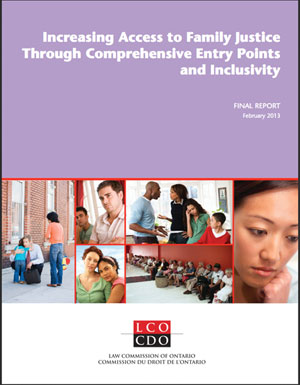The issues family law litigants face can be addressed not just by the justice system, but through a more holistic approach that leverages the connection and know-how of other community services, according to the Law Commission of Ontario’s final
report on family law reform.

Part of running an effective family law system means identifying when litigants’ problems are not, in fact, legal and should be dealt with by other experts, says the report released last week.
“It’s an early way of triaging, an early way of saying, ‘What are people’s needs and what really is related to the problem?’” says Patricia Hughes, the family law reform project head at Law Commission of Ontario.
“You say, ‘Is this related to the fact that the family is in debt? Does somebody have mental health difficulties or has some issues around children?’ So that rather than just jumping into conclusion that this is all about law, you have ways of finding out and bringing in other kinds of expertise.”
In his courtroom, Ontario Court Justice Harvey Brownstone says referral to other programs is routine. Sometimes, he says, what bitterly combative ex-spouses need is counselling — not legal help.
“Many times I’ve said to people, ‘Look you don’t need a judge. You guys need to learn how to overcome your pain and start to work with each other,’” he says.
In such cases, Brownstone has sent people to programs like Family Service Toronto’s program for families in transition.
Created in 2009, the law commission’s family law project set out to find how to simplify and improve a system often said to be in crisis.
The commission recommends the Ontario government launch two pilot projects in different areas of the province to test drive a service based on the benchmarks they listed. These legal services, Hughes says, would work closely with other services and experts to create what she calls “a spiderweb of services.”
The idea has been around for a while, says Brownstone, who notes it would be much less costly for the system to find out if people’s problems can be resolved by someone other than a judge before they get into the courtroom. But figuring out who should be responsible for deciding who gets to see a judge is tricky, he says. For his part, Brownstone says such decisions should come from a person who has a degree in both law and social work and not have it let up to a court clerk to make the call.
“We don’t want to set up a barrier where somebody comes to court and they haven’t been able to convince a low-level administrative clerk that they really need a judge,” he says.
The LCO’s report also says while the majority of family law litigants navigate the justice system solo, Ontario’s court system still assumes they’re represented by a lawyer.
“With some (important) exceptions, our system presumes homogeneity on the part of users, it is premised on the presence of lawyers who have specialized knowledge and training to shepherd lay people through the system and for the most part, it divorces the legal problem from the other issues that attend relationship breakdown,” the report states.
“We believe that any further reform of the system must address these issues in order to create meaningful access to the family justice system for the citizens of Ontario.”
As legal representation becomes an option only for the very rich or very poor, ordinary Ontarians are left to their own — and the Internet’s — devices, often with ineffective outcomes, says the report.
While online self-help tools are important, their usefulness to people without access to computers or literacy skills is overestimated, the report adds, noting some in-person assistance is needed to help litigants apply generic advice to their specific legal issues.
“There’s a tendency [to think] if we provide people with enough information, they can represent themselves,” says Hughes. “That’s not the case.”
The benchmarks of a comprehensive service include creating a single online “hub” for family law information, making written information available for those without access to computers, and providing assistance to people who cannot synthesis this information, Hughes says.
While a more holistic approach to family law problems is important, the law commission says ensuring access also means rethinking what lawyering means.
“We must take a hard look at what ‘lawyering’ entails and find ways to create competent and effective legal services outside full scope representation by a lawyer,” it states.
“Delivering legal services differently may mean that lawyers do not provide full-service delivery or do not provide them through private practice; it may mean alternative billing arrangements or ‘a limited scope retainer’ (also known as ‘unbundled services’).
“Delivering services through different people may mean paralegals, if they are given authority to do so, or students, both within prescribed parameters.”
But when it comes to the use of paralegals in family law, Brownstone has a word of caution.
“The only thing that disturbs me in this report is the suggestion that we should allow paralegals to represent people in family law,” he says. “That would be a big step backwards. It may be appealing on the surface . . . but family law is complicated.”
While Legal Aid Ontario cannot expand its services to middle class Ontarians without “a significant infusion of funds,” perhaps the organization can act as a “broker” for low-cost legal services, the report also suggests.

 Part of running an effective family law system means identifying when litigants’ problems are not, in fact, legal and should be dealt with by other experts, says the report released last week.
Part of running an effective family law system means identifying when litigants’ problems are not, in fact, legal and should be dealt with by other experts, says the report released last week.